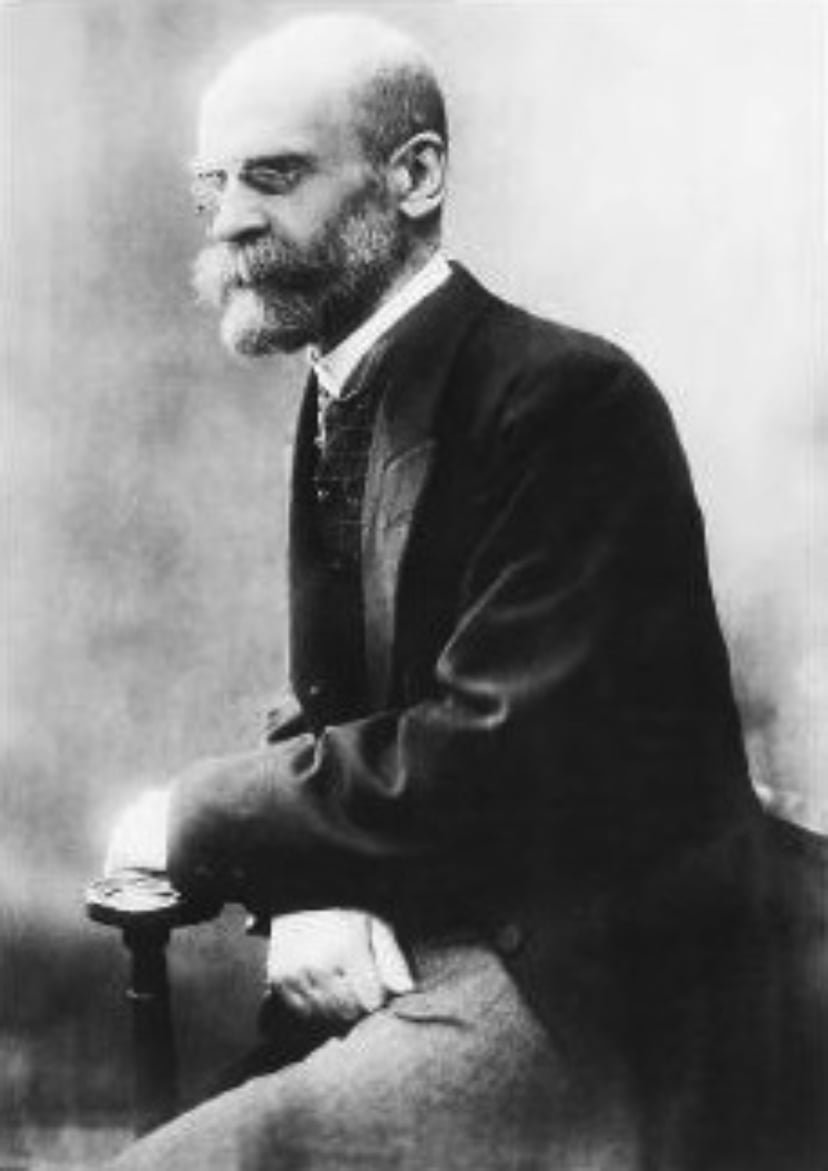

Emma

|
エマ
|
|
|---|---|
| Personal Description | |
| Nihongo | エマ |
| Vital Information | |
| Gender | Female |
| Age | 11 (2045) |
| Status | Alive |
| Height | 145 cm (2045) |
| Family | 63194 |
| Affiliation | The Human World |
| First Appearance | |
| Manga Debut | Chapter 1 |
- Role: Main protagonist ofThe Promised Neverland
- Traits: Kind, optimistic, resourceful, highly intelligent, and athletic
|
Émile Durkheim
|
|
|---|---|
| Born |
David Émile Durkheim
15 April 1858 Épinal, France
|
| Died | 15 November 1917(aged 59)
Paris,France
|
| Nationality | French |
| Alma mater | École Normale Supérieure |
| Known for | Sacred–profane dichotomy Collective consciousness Social fact Social integration Anomie Collective effervescence |
| Scientific career | |
| Fields | Philosophy, sociology, education, anthropology, religious studies |
| Institutions | University of Paris, University of Bordeaux |
| Influences | Immanuel Kant, René Descartes,Plato, Herbert Spencer,Aristotle, Montesquieu, Jean-Jacques Rousseau, Auguste Comte. William James, John Dewey, Fustel de Coulanges, Jean-Marie Guyau, Charles Bernard Renouvier, John Stuart Mill |
| Influenced | Marcel Mauss,Claude Lévi-Strauss, Talcott Parsons, Maurice Halbwachs, Jonathan Haidt, Lucien Lévy-Bruhl,Bronisław Malinowski, Fernand Braudel, Pierre Bourdieu, Charles Taylor, Henri Bergson, Emmanuel Levinas, Steven Lukes, Alfred Radcliffe-Brown, E. E. Evans-Pritchard, Mary Douglas, Paul Fauconnet, Robert N. Bellah, Ziya Gökalp, David Bloor, Randall Collins, Neil Smelser[1] |
Storyline Highlights
- Discovery of Grace Field’s Secret: Emma’s journey begins when she, along with Norman, uncovers the truth about the orphanage and its dark purpose as a farm for demons. This discovery motivates her to plot an escape to protect herself and her friends.
- Escape from Grace Field House: Leading a group of orphans, Emma successfully escapes from Grace Field House, outsmarting the caretaker, Isabella. This escape is the first step toward her long-term mission of finding freedom for all the children.
- Search for William Minerva: After escaping, Emma becomes determined to locate William Minerva, whom she believes will help guide them to a life free from the threat of demons. This journey becomes a central focus of her mission, shaping her decisions as she and her friends venture into the unknown.

Emma stands resolute with her mask in place, embodying her unwavering bravery and commitment to protecting those she loves, even as she ventures into the darkest challenges.
Personality and Traits
Emma is known for her caring and extroverted nature, often acting as the heart of Grace Field House and forming strong bonds with her fellow orphans. Her positivity and determination inspire those around her, and she maintains a hopeful outlook even in challenging situations. Despite the dangers she faces, Emma consistently shows bravery and a deep-seated sense of justice, especially in her desire to protect and ensure freedom for her loved ones.
Emma’s resilience is driven by her unwavering optimism and selflessness. She views her companions as family and will go to great lengths to ensure everyone’s safety. Unlike others who may accept compromise, she seeks solutions that align with her moral values, refusing to abandon any of her friends.
Relationships
Norman
Emma shares a close and loyal bond with Norman, who is one of her dearest friends and allies. Their personalities complement each other, with Norman’s strategic mind often balancing Emma’s optimism and compassion.
Ray
As one of her closest friends, Ray provides Emma with a realistic perspective and acts as a counterbalance to her idealism. While they occasionally clash over methods, their loyalty to each other remains steadfast.
Isabella
Isabella, the caretaker of Grace Field, represents both an emotional and intellectual challenge for Emma. Their relationship is complex; Isabella’s role as both protector and captor creates a nuanced dynamic, as Emma struggles to reconcile her feelings of betrayal with the motherly figure she once trusted.
Key strengths include
- Problem-Solving: Emma is quick to understand complex situations and devise plans, especially under pressure.
- Physical Prowess: She is highly agile and possesses notable stamina and strength, aiding her in critical escape scenarios.
- Leadership: Emma’s compassionate and supportive nature makes her a trusted leader among her peers.
Trivia and Insights
- Name Meaning: Emma’s name translates to “whole” or “universal,” reflecting her inclusive and compassionate nature, as she strives to save all of her family rather than prioritizing her own safety.
- Animal Symbolism: She is often associated with deer, symbolizing gentleness, innocence, and grace, yet also representing vigilance and adaptability, qualities she embodies as she faces danger.
- Physical Markings: Like all the orphans, Emma has a number on her neck—63194, which signifies her status within the farm’s system.
Emma’s unwavering courage, intellectual acumen, and compassion define her as an inspirational figure for her friends and allies, embodying the relentless hope and resilience that drive the story forward. Her journey from a sheltered orphan to a determined leader highlights her growth and the strength of her convictions.